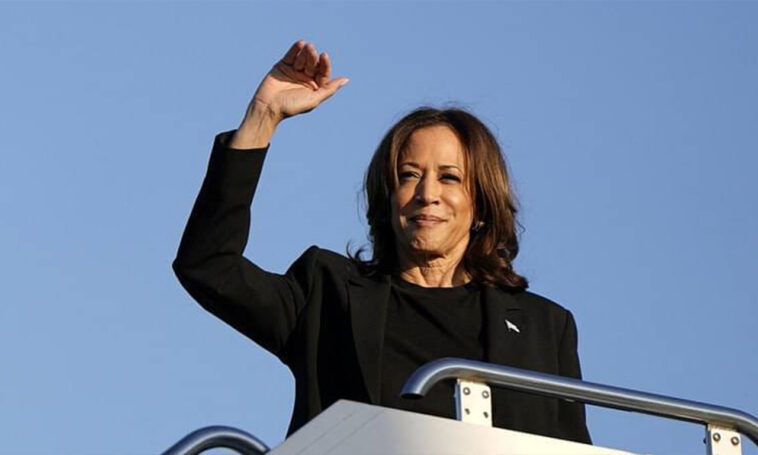Vice President Kamala Harris recently responded to a controversial remark made by Ohio Senator JD Vance, who had previously referred to her as a “childless cat lady.” The comment, made in 2021, resurfaced in public discourse following similar statements from Arkansas Governor Sarah Huckabee Sanders, who implied that Harris lacks humility because she does not have children of her own.
Governor Sanders, in a speech last month, remarked that her children “keep humble” and suggested that, unlike herself, Kamala Harris has “nothing keeping her humble.” The vice president chose to address this statement during her appearance on the widely popular podcast Call Her Daddy, hosted by Alex Cooper. The podcast, known for its sex-positive discussions, has garnered a massive following and is recognized as the “most-listened-to podcast by women,” according to Spotify.
In response to Governor Sanders’ remarks, Harris expressed empathy but was clear in her rebuttal. “I feel sorry for her,” Harris told Cooper during the episode. “I don’t think she understands that there are a whole lot of women out here who, one, are not aspiring to be humble, and two, a whole lot of women out here who have a lot of love in their life, family in their life, and children in their life.” She further emphasized the importance of women supporting one another, adding, “I think it’s really important for women to lift each other up.”
Harris’ response highlights a broader issue—how societal expectations around motherhood and family structures are often used to critique or undermine women in leadership positions. In Harris’ case, the narrative being pushed by some critics that she is “childless” is not only incorrect but also reductive. Harris is, in fact, a stepmother to her husband Doug Emhoff’s two children, Cole and Ella, whom she refers to affectionately as her “beautiful children.”
After Vance’s comment resurfaced, Harris’ stepdaughter, Ella Emhoff, playfully refuted the notion of Harris being “childless,” writing, “How can you be ‘childless’ when you have cutie pie kids like Cole and I? I love my three parents.” This modern family dynamic, which Harris proudly discusses, further challenges outdated views of what constitutes a “traditional” family.
During her interview with Cooper, Harris elaborated on the diversity of family structures in today’s world. “We have our family by blood, and then we have our family by love, and I have both,” she said. “I consider it to be a real blessing. And I have two beautiful children, Cole and Ella, who call me ‘Momala.’ We have a very modern family. My husband’s ex-wife is a friend of mine.” This perspective underscores the evolving nature of family and highlights how love, not biology, defines meaningful relationships. Harris went on to say, “Family comes in many forms, and I think increasingly, all of us understand that this is not the 1950s anymore. Families come in all shapes or forms, and they are family nonetheless.”
The conversation didn’t stop there. Harris was also asked about JD Vance’s earlier statement, in which he claimed that the “entire future of the Democrats is controlled by people without children.” In that same comment, Vance questioned the leadership of individuals without direct familial ties to the future, stating, “How does it make any sense that we’ve turned our country over to people who don’t really have a direct stake in it?”
Harris did not shy away from responding, calling the remark “mean and mean-spirited.” She added that she believes most Americans want leaders who focus on uplifting others. “I think that most Americans want leaders who understand that the measure of their strength is not based on who you beat down,” Harris said. “The real measure of the strength of a leader is based on who you lift up.”
During the podcast, Harris also took the opportunity to discuss her journey into public service, specifically why she became a prosecutor. She recounted how her friend Wanda was sexually assaulted, an experience that fueled her desire to protect women and seek justice for survivors of sexual violence. This personal story, which she also shared during her speech at the Democratic National Convention, reflects Harris’ long-standing commitment to fighting for women’s rights.
Alex Cooper also brought up a viral moment from 2018, when Harris, then a U.S. Senator from California, questioned Supreme Court nominee Brett Kavanaugh during his confirmation hearings. At the time, Harris fiercely pressed Kavanaugh on his views about abortion, demonstrating her dedication to protecting reproductive rights—a commitment that continues to be a cornerstone of her political platform.
Harris’ appearance on *Call Her Daddy* not only allowed her to address harmful stereotypes about women and family but also showcased her resilience in the face of personal and political attacks. As she reflected on her own family and her role as a leader, Harris made it clear that being a woman in power—whether or not she has biological children—does not diminish her ability to lead with empathy, strength, and purpose.
The conversation highlighted the evolving nature of what it means to have a family in the modern world and reaffirmed Harris’ belief that a leader’s worth is measured by how they uplift those around them, regardless of their personal life circumstances. As the podcast episode circulated widely, it sparked an important conversation about the unfair expectations often placed on women, particularly those in positions of power, and reinforced the need for a more inclusive understanding of family and leadership.



